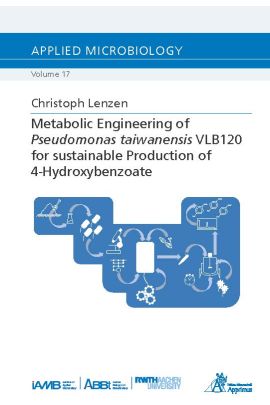Aromatic chemicals such as 4-hydroxybenzoate define our everyday life. However, their production is accompanied by harsh and unfavorable conditions as well as the exorbitant use of fossil resources. Biotechnological formation of aromatics represents a safe, sustainable and environmentally friendly alternative.
4-hydroxybenzoate finds broad industrial application. Besides being a precursor for pharmaceuticals and fibres, it is the mother molecule of the paraben class, whose representatives are used as antimicrobial agents in numerous products.
In this thesis, a biotechnological approach was undertaken in order to synthesize 4-hydroxybenzoate in high yields from the renewable substrates glucose and glycerol. Due to its remarkable metabolic architecture, superior tolerance towards organic solvents and its non-pathogenic nature, Pseudomonas taiwanensis VLB120 was chosen as production host.
After integration of the biosynthetic pathway of 4-hydroxybrenzoate from the precursor tyrosine, rational metabolic engineering techniques for carbon flux improvement towards product formation were applied. In doing so, key genes within the shikimate pathway as well as the central carbon metabolism were overexpressed, whereas flux towards competing pathways was decreased by knockouts and the integration of a point mutation. The strains engineered in this way show the highest 4-hydroxybenzoate production performance in a complete minimal medium that has been described in literature so far.
Further production improvement was conducted via non-rational metabolic engineering by screening a mutant library generated by chemical mutagenesis using an engineered fluorescence-based biosensor. With this setup, a mutant with superior production performance compared to the non-mutagenized strain was found. Also, the production of 4-hydroxybenzoate was coupled to the growth of the biocatalyst by creating a metabolic demand for acetyl-CoA, which is a byproduct of 4-hydroxybenzoate biosynthesis via tyrosine. Using this system, enhanced production of 4-hydroxybenzoate by adaptive laboratory evolution was successfully enabled.
In total, this work brings the sustainable production of aromatics one step closer and acts as an example for the development of the envisaged bioeconomy.
| Autor | Lenzen, Christoph |
|---|---|
| Lieferzeit | 3-4 Tage |
| Gewicht | 0.254 kg |
| Erscheinungsdatum | 14.02.2020 |
Reihen
Metabolic Engineering of Pseudomonas taiwanensis VLB120 for sustainable Production of 4-Hydroxybenzoate
Kurzbeschreibung
By using microbial cell factories for the production of aromatics from sustainable substrates, drawbacks such as dependency on fossil resources as well as unfavorable production conditions can be circumvented.
This dissertation deals with the rational and non-rational metabolic engineering of Pseudomonas based biocatalysts for the production of 4-hydroxybenzoate in high yields from glucose and glycerol. The gained results bring the bio-economic formation of aromatics one step closer.

